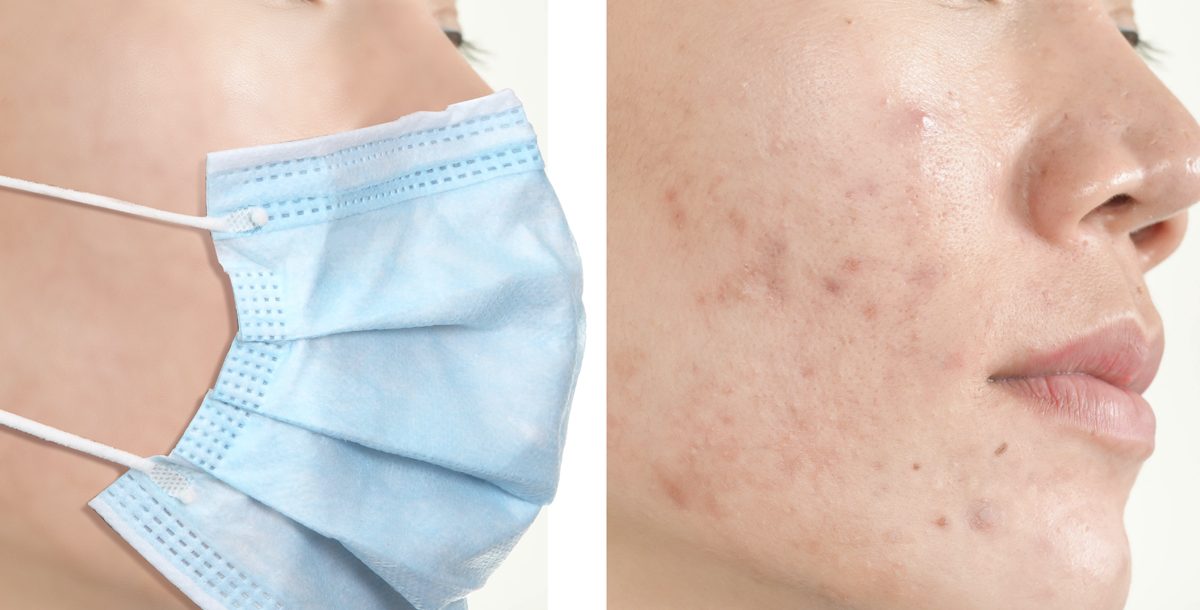The Centers for Disease Control and Prevention (CDC) and leading medical experts share that wearing a face mask is critical for preventing the spread of COVID-19. In some states and cities, wearing a cloth face covering in public is required. Whether it’s disposable, homemade, or an N-95, wearing masks is the new normal for us as we try to protect those around us from possible infection.
However, you should be aware that wearing a mask regularly may have some negative effects on your skin, such as acne and other irritations. This condition has been coined “maskne.”
“Maskne breakouts occur on the lower portion of the face from wearing a mask for a long period of time. Maske is a type of acne mechanica, which refers to the irritation that is formed by excess pressure, heat, and rubbing against the skin,” shares Valerie Nemeth, DO, at Mercy Health – Vermilion Primary Care.
Here are a few ways you can prevent “maskne” flare ups.
- Wash your masks. If you’re using a cloth or reusable mask, be sure to wash it in the washing machine and dry it completely after every use. If you’re using a disposable mask, it’s tempting to re-use it. However, it could be a breeding ground for bacteria, so you should throw it away after wearing it. Cotton masks allow the skin to breathe best.
- Use gentle skin care products. These don’t have to be expensive or fancy. Light, gentle, non-oily cleansers are best, and look for ones that are fragrance-free. Try to avoid wearing makeup such as foundation when wearing a mask so your skin is able to breathe.
- Wash your face. Gently wash your face in the morning and at night. Don’t use scrubs or cloths to clean your skin. Instead, just use your fingers. Then, wait at least 15 minutes after applying moisturizer or sunscreen before putting your mask on. Pro tip: mineral sunscreen that contains zinc acts as a natural anti-inflammatory for the skin.
- Avoid oily products. Heavy oil-containing products can make you sweat quicker and clog your pores. Use moisturizers or makeup products that are lightweight and oil-free.
- Stick to the basics. If your skin care regimen is typically extensive and consists of several products, you may want to reduce the number of products that are being used on your face for the time being. The more ingredients on your skin, the higher risk for irritation to occur. Give your skin time to recover and inflammation to reduce before using different products.
Here are a few ways to treat “maskne” at home.
- Spot treatment for active acne lesions. Benzoyl peroxide is a common over-the-counter topical medication used for acne, helping to reduce inflammation, exfoliate dead skin cells and kill bacteria that cause acne lesions. Look for products with 2.5-5% benzoyl peroxide at your local store. Anything higher than 5% will cause more irritation and isn’t more effective than lower percentages.
- Try a hydrocolloid pimple patch. These patches gently absorb excess fluid and protect your breakouts from further bacteria and irritation. These can even be worn under your mask to prevent rubbing between the mask and the pimple.
It’s very important for everyone to wear face masks to reduce the spread of COVID-19.
Because COVID-19 spreads through respiratory droplets produced by an infected person – especially when they cough, sneeze, talk or raise their voice — a mask can prevent these droplets from landing on or being inhaled by others. You should also practice other preventive measures, such as social distancing, frequent handwashing and cleaning and disinfecting.
Stay updated on what Mercy Health is doing related to COVID-19.






